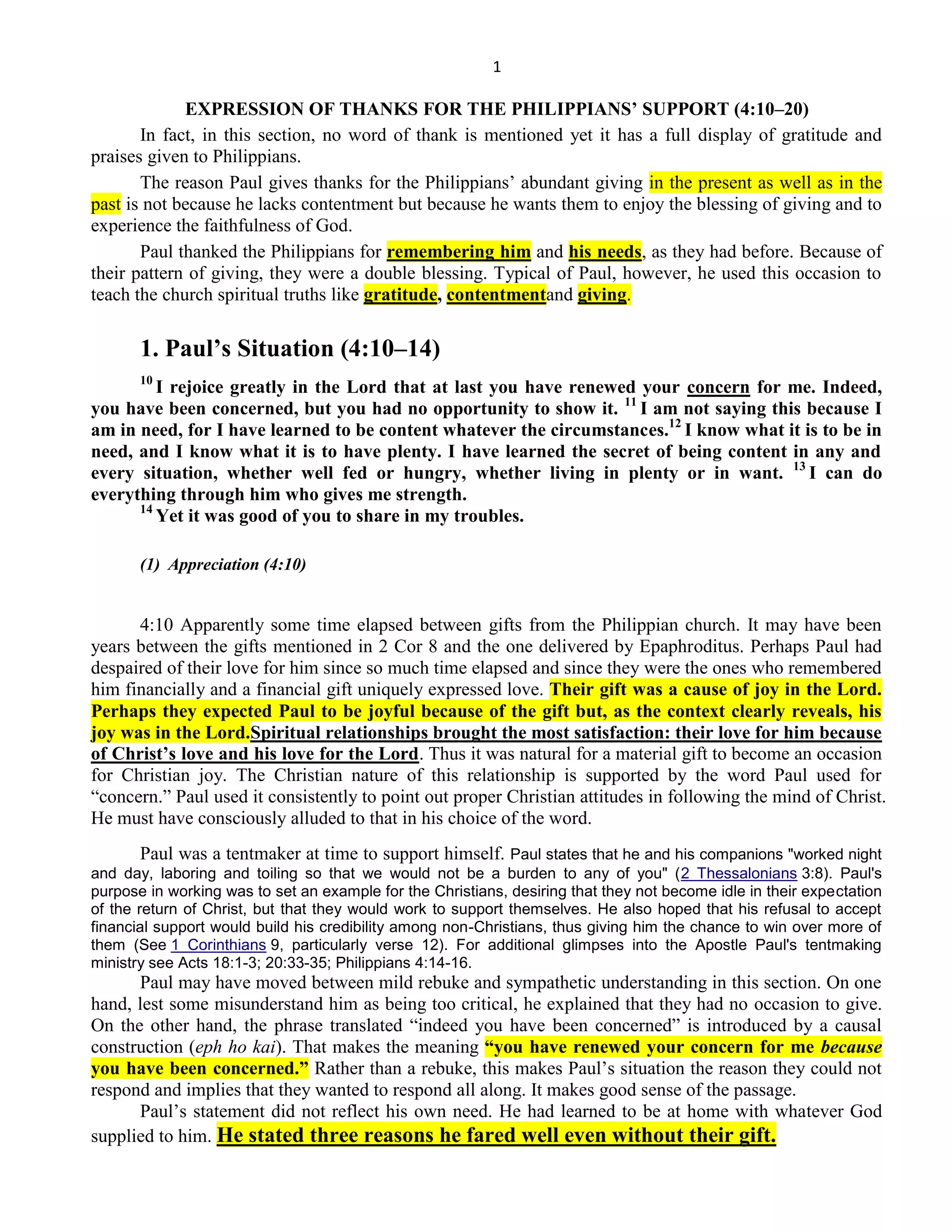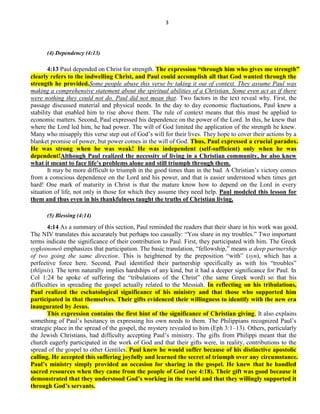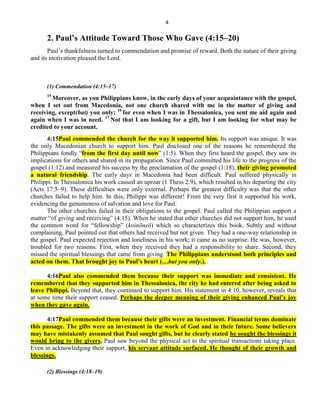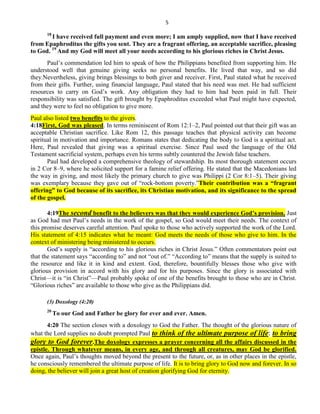1. Paul thanks the Philippians for renewing their support of him after some time had passed. Though he has learned to be content in all circumstances, their gift was still appreciated and a blessing to his ministry work.
2. Paul explains that he does not seek their gifts out of personal need, but because their giving supports the spread of the gospel and brings spiritual blessings. Their generous support from the early days of Paul's ministry in Philippi stood out compared to other churches.
3. Giving to support Paul's ministry work is pleasing to God and will result in God meeting the Philippians' own needs, just as he has met Paul's needs through their gifts. Their sacrificial giving is

![2
(2) Contentment (4:11)
4:11The first reason Paul did not need the gift was his own contentment. Twice in these verses
(v11 & 12) he stated that he had learned contentment. One word, emathon, was natural to use. It speaks
to having arrived at a fact of understanding. The other word, memyēmai, often appears in the mystery
religions. It means to learn the secret and conveys the idea of a secret knowledge to which adherents of
the mystery religions aspired. The word conveyed what Paul desired. Contentment is learned through
experience. [It is a commandment to be content in our life- Heb13v5] Paul used another rare word for
―to be content.‖ The etymology means ―self-reliant,‖ and the context supports that meaning. It is a self-
sufficiency because of Christ, however, as Paul clearly stated in 4:13. He meant that he came to grips
with his circumstances and fared well in and through them because of his own relationship to Christ. He
did not need help.
The Secret of Contentment
A. Phil 1:21
For to me,to live is Christ and to die is gain.(NASB)
Paul’s leading example is Christ in his life. Christ is all he possessed and Christ was the foundation and
objective of his faith. Despite his imprisonment, he suffered loneliness, poverty, depravation, he was in
joyous mood and contented.
B. Phil2:5
Have this attitude in yourselves which was also in Christ Jesus,
When Paul had this mind of Christ in him, he learned to be abased as a servant of Christ. That
means he yielded his will and followed Christ absolutely according to God’s Will
.
C. Phil4:4
Rejoice in the Lord always; again I will say, rejoice!
To rejoice in the Lord is a living testimony and encouragement to the believers at Philippi. We can
only rejoice when one’s heart is occupied with only the Lord’ presence. The worldly things and
seeking of materials will be completely oblivious to Paul as his heart and mind is at rest, full of
peace and joy.
Joy derived from contentment
(3) Adaptability (4:12)
4:12 Circumstances were the arena of spiritual growth, and through them Paul developed
adaptability. In this verse Paul presented three contrasts that provided the occasion for learning and
explained the nature of contentment. The first and last speak to physical needs in general, while the
middle refers to food. In these varied experiences, Paul displayed spiritual equilibrium. He was equally
unaffected by poverty and riches. This knowledge is learned by walking withChrist, who is the
sufficient one, and by developing a solid theology of material things. Things ultimately do not
matter. Relationships matter.Contentment with each other will help you overcome
hurts and nurture love.Paul’s attitude contrasted with the false teachers’. They were preoccupied
with food and other earthly matters; Paul could rise above any set of circumstances.](https://image.slidesharecdn.com/christiancontentment-alexloh-140401091821-phpapp02/85/Christian-Contentment-Alex-Loh-2-320.jpg)



![6
CONCLUSION (4:21–23)
21
Greet all the saints in Christ Jesus. The brothers who are with me send greetings. 22
All the
saints send you greetings, especially those who belong to Caesar’s household.
23
The grace of the Lord Jesus Christ be with your spirit. Amen.
4:21–22 The conclusion of Philippians is typical of other epistles, including exhortations to greet
the brothers and greetings from Christians in the place of writing. These concluding remarks are
abbreviated, but significant. Paul sent greetings from three groups of persons with him. First, greetings
were sent from the brethren who surrounded him, his team of men who supported him and served with
him. [It's very likely that Tychicus and Aristarchus were there, well known and noble Christians. There are
many who would tell us that Luke was there and Mark was there.]No doubt they knew the church well.
Second, greetings were sent from other saints with whom Paul had contact. The term ―all the saints‖ must
mean those in the church at Rome, who were not specifically a part of Paul’s band of men. Such
greetings were commonly exchanged as a mark of Christian friendship and brotherhood. Finally,
greetings came from Christians in Caesar’s household. The unusual manner of identifying them as a
―household‖ suggests that they were not family members. Most assume that they were in Caesar’s civil
service. Perhaps because of Philippi’s importance as a colony and financial center, some of them had
regular business contacts with the Christians at Philippi. The interchange of greetings was an important
way of maintaining contacts with the Christians around the empire.
There is one word that is repeated twice in these two verses to which I would like to draw your attention.
That is the word "saint." It appears in verse 21. It appears again in verse 22. It is a familiar word to us but
admittedly somewhat understood wrongly or improperly by most people. Roman Catholic theology teaches is that
they have special work of interceding with God for the souls of people which are captive to the pain of purgatory.
And so as you pray to the saint, in a sense you are pleading with that saint to appeal to God to release the one that
you love from the pain of purgatory. In fact, you will frequently see in a Roman Catholic Church candles at the
feet of the saints, which candles are lighted and as long as the candle is still burning, the prayer is perpetual to the
saint to plead with the saint, to plead with God to get that soul out of purgatory. The word hagiosor hagioi(?) in
plural, simply means "set apart ones, separated ones, sanctified ones or perhaps best, holy ones." That's just a list of
synonyms for the word "saint." The concept is "being set apart, being separated." Now we know that the Bible says
that God is holy. The word can be translated holy, is often translated holy in Scripture, it means the same thing. We
know that God is holy, or God is saintly or God is separated. Anyone who is separated from sin unto God is a saint.
4:23 Paul’s final words implored the grace of God. He ended like he began—with a prayer for
grace. Possibly he had a collective church spirit in mind, but most likely he referred to the spirits of
individuals. Read, with the best manuscripts, with your spirit.The spirit stands for the entire person,
spiritually sensitive through this aspect of human beings. God communicated with their spirits, and
through them he brought the riches of his grace wherever it was needed. In an epistle which presents
clearly the polarities between law and grace, works and faith, and self-righteousness and divinely
imputed righteousness, it is significant that the final line should be grace. Fittingly he reminded
them that everything good they had came because of God’s grace.
You’re blessed when you’re content with just who you are, what you have—no more, no less.
That’s the momentyou find yourselves proud owners of everything that can’t be bought.](https://image.slidesharecdn.com/christiancontentment-alexloh-140401091821-phpapp02/85/Christian-Contentment-Alex-Loh-6-320.jpg)